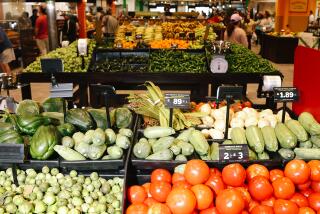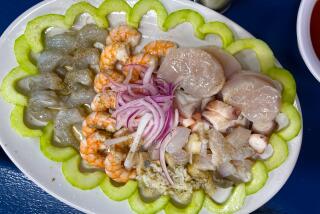One man’s animal attraction to succulent Spanish pork
- Share via
Breakfast in Spain, says expat Brit food writer John Barlow, is coffee and cigarettes. It’s “just not a morning sort of country.” Especially given Spaniards’ skewed sense of time. Evening is called afternoon and noon is called midmorning; midday is about 3 p.m., so lunch can run past 4:30. “People stay up,” he writes in “Everything but the Squeal,” “and invariably that means staying out -- until ridiculously late, go home at dawn, sleep for eleven minutes, get up again, and go off to work.” Well, no wonder the coffee and cigarettes.
Barlow’s days of leading such a life are over. He’s a family man now, husband of the lovely Susana, whom he claims may be Spain’s only native vegetarian, and father of a young son, Nico. They live in Coruna, a seaside town nicknamed the Crystal City, in Galicia, Spain’s remote northwest corner. Although it’s one of the least-known regions of Western Europe, it has produced many interesting characters, including Gen. Francisco Franco and the Castro family. Galicia’s economy is among the weakest in the country; its rainy climate and green mountains run counter to stereotypes of dusty plains, torrid heat and spectacular bullfights. But its food -- once you move beyond those utterly inadequate breakfasts -- is to die for.
Galicia’s cuisine, especially its pork, so captivates Barlow that he decides to explore his adopted homeland. “In each place,” he explains, “I’ll sample a different part of the pig, in a year-long pursuit of pure pork, the fattiest, juiciest, most unashamedly rustic of meats.” Pork, he notes, stands at the center of Galician country cooking, which he fell in love with nearly 20 years ago. And his challenge includes eating every part of the pig in as many places as possible. A “porco-graphical tour” to savor “everything the tasty animal has to offer. Everything but the squeal.”
A person clever enough to make his way in this world by traveling, pigging out and then writing of such difficult duty might arouse a bit of envy among armchair travelers, but Barlow is so unabashedly in love with almost all things porcine (though maybe not trotters, feet or botelo, “smashed-up vertebrae and other stuff” boiled in a bag of intestines) that rambling the countryside with him is a mouthwatering adventure.
In Vila de Cruces, for instance, the family attends the annual chorizo festival. Barlow is nearly reduced to drooling, so delectable are the town’s tantalizing aromas, but for Susana, the “pungent bacon cologne wafting on the breeze” triggers nothing like her desire for, say, a well-roasted eggplant. While Barlow fights his way through throngs to obtain a half-dozen scrumptious sausages, Susana nibbles bread; Nico has a banana.
Although a good sport, Susana opts out of Laza’s Dirty Day, which follows the big festive Sunday of Entroido (Carnival). Barlow’s quest this time is boiled hog head, and the chunk of cheek he captures is both tender and satisfying, providing a peaceful moment during a day of otherwise total mayhem.
As the year passes, Barlow visits the Galician countryside, a place still largely without cellphones or BlackBerrys, where people relax, offer homemade wine and are often hospitable enough to ask his favorite question: Can you stay for lunch?
Barlow learns that the Celtic pig, once thought extinct, in fact roams freely in Galicia’s forests for three or four years, maturing contentedly, bred as well as fed for the quality of its meat. Contrast this approach, he suggests, to industrial porkers “suckled from a sow so tightly caged she cannot turn her head to see her own offspring; a few miserable months in a light-deprived pig pound, eating protein-enriched grain mix; then the horror of the stun-gun parade.” When he attends a matanza, a traditional multifamily pig kill in November, the animals have not gone “from neonate to dinner plate in a matter of weeks,” but lovingly and leisurely.
And because much of the fare in restaurants and shops is still locally produced, organic food is the norm. Speed and quantity, so prized in some parts of the world, are almost irrelevant here. During a 12-course lunch at Casa Solla near Pontevedra, for example, 2 1/2 pork ribs on a half potato and five petits pois “are less than what you get stuck between your teeth” elsewhere but, in company with so many other delights, are perfect.
Whether cruising tapas bars, enjoying small-town festivals, sampling rural roadhouse specialties or farmers’ home-grown provisions, Barlow manages to eat pretty much the whole hog -- even brains and heart, if not genitals -- with an admirably old-fashioned passion for one of life’s prime joys.
--
Wanner has written for many publications, including the San Francisco Chronicle, the Seattle Times and High Country News.
More to Read
Sign up for The Wild
We’ll help you find the best places to hike, bike and run, as well as the perfect silent spots for meditation and yoga.
You may occasionally receive promotional content from the Los Angeles Times.






